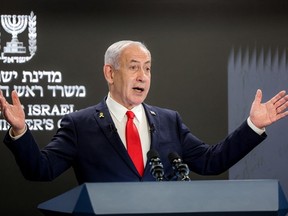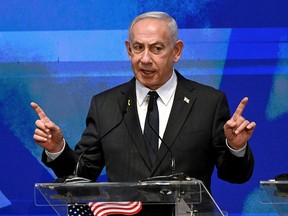World
Israeli Military Leaders Challenge Netanyahu’s Gaza Strategy

Tensions surrounding Israel’s military strategy in Gaza have escalated following a public disagreement between Eyal Zamir, the current chief of the general staff of the Israel Defense Forces, and Prime Minister Benjamin Netanyahu. Zamir criticized Netanyahu’s decision to re-occupy Gaza City, arguing that it could overextend an already strained military and jeopardize the safety of approximately 20 hostages believed to be alive.
Zamir’s remarks come at a time when the conflict has entered its 23rd month, with Israeli forces engaged in ongoing military operations. In response to Zamir’s concerns, Netanyahu’s son accused him of attempting a coup, highlighting the divisions within Israel’s leadership regarding the war’s direction.
The criticisms extend beyond military ranks. An open letter addressed to former U.S. President Donald Trump has been signed by 600 former Israeli military and security officials, including prominent leaders from Mossad and Shin Bet. This letter urged Trump to exert pressure on Netanyahu to conclude the conflict, reflecting a broader unease among security experts about the current military strategy.
Former Leaders Raise Concerns Over Military Objectives
A video accompanying the letter featured Ami Ayalon, a member of Israel’s opposition Labour party and former head of Shin Bet, who stated, “At first this was a just war, a defensive war, but when we achieved all military objectives this war ceased to be a just war.” He warned that the current approach could ultimately compromise Israel’s security and identity.
This sentiment echoes the views expressed in the acclaimed 2012 documentary, “The Gatekeepers,” which featured interviews with former heads of Shin Bet. These leaders, who once oversaw operations against terrorism, have publicly stated their belief that Israeli governments failed to pursue peace negotiations for an independent Palestinian state following the 1967 war. Their criticism centers on the notion that while tactical measures against terrorism were prioritized, a comprehensive strategy to resolve the conflict was neglected.
The former officials also took aim at the ongoing expansion of Israeli settlements in the West Bank, arguing that these actions hinder the path to peace. They noted that the most significant opportunity for peace, represented by the Oslo Accords in the 1990s, was undermined not by external forces but rather by internal failures within Israel.
Historical Context and Current Implications
The assassination of Israeli Prime Minister Yitzhak Rabin in 1995 by Yigal Amir, a radical Orthodox Jew, serves as a focal point in the discussions about Israel’s security failures. The former Shin Bet heads argued that this assassination, incited by extremist elements, was one of the major setbacks in achieving peace. They criticized the atmosphere of hostility fostered by elements within the Israeli government, including Netanyahu’s Likud party, which they believe contributed to Rabin’s assassination.
Furthermore, they contend that the ongoing occupation has had a detrimental effect on Israeli society. Avraham Shalom, a former head of Shin Bet, remarked, “The future is bleak… if you put most of our young people in the army, they’ll see a paradox. They’ll see it strives to be a people’s army… involved in building up the country. On the other hand, it’s a brutal occupation force.”
The current military strategy, according to Ayalon, raises important questions about Israel’s future. He noted, “Victory doesn’t dictate that we have to conquer Gaza or Ramallah or Nablus or Hebron.” This sentiment reflects a growing frustration among military and political leaders that, despite winning individual battles, Israel may be losing the overarching conflict.
As the situation in Gaza continues to evolve, the implications of these criticisms from within Israel’s military and security establishment could shape future policies and strategies in the region. The ongoing debate highlights a critical examination of the current approach to security and the need for a more comprehensive resolution to the Israeli-Palestinian conflict.
-

 Politics4 weeks ago
Politics4 weeks agoSecwepemc First Nation Seeks Aboriginal Title Over Kamloops Area
-

 World5 months ago
World5 months agoScientists Unearth Ancient Antarctic Ice to Unlock Climate Secrets
-

 Entertainment5 months ago
Entertainment5 months agoTrump and McCormick to Announce $70 Billion Energy Investments
-

 Science5 months ago
Science5 months agoFour Astronauts Return to Earth After International Space Station Mission
-

 Lifestyle5 months ago
Lifestyle5 months agoTransLink Launches Food Truck Program to Boost Revenue in Vancouver
-

 Technology3 months ago
Technology3 months agoApple Notes Enhances Functionality with Markdown Support in macOS 26
-

 Lifestyle3 months ago
Lifestyle3 months agoManitoba’s Burger Champion Shines Again Amid Dining Innovations
-

 Top Stories2 months ago
Top Stories2 months agoUrgent Update: Fatal Crash on Highway 99 Claims Life of Pitt Meadows Man
-

 Politics4 months ago
Politics4 months agoUkrainian Tennis Star Elina Svitolina Faces Death Threats Online
-

 Sports5 months ago
Sports5 months agoSearch Underway for Missing Hunter Amid Hokkaido Bear Emergency
-

 Politics5 months ago
Politics5 months agoCarney Engages First Nations Leaders at Development Law Summit
-

 Technology5 months ago
Technology5 months agoFrosthaven Launches Early Access on July 31, 2025





















